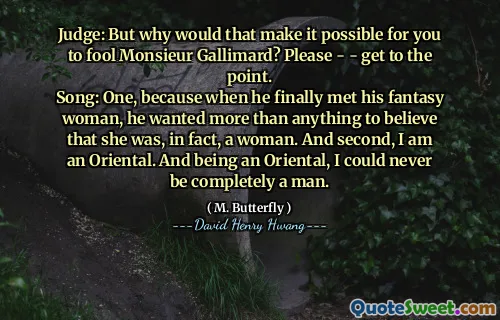
Judge: But why would that make it possible for you to fool Monsieur Gallimard? Please - - get to the point. Song: One, because when he finally met his fantasy woman, he wanted more than anything to believe that she was, in fact, a woman. And second, I am an Oriental. And being an Oriental, I could never be completely a man.
This exchange from David Henry Hwang's play '(M. Butterfly)' illuminates themes of identity, illusion, and the fluidity of gender roles. The character’s explanation reveals the intricate layers of performance and perception, especially emphasizing how societal and internalized notions of masculinity and femininity shape individual identities. The idea that someone could fool others into believing a constructed reality speaks to the performative nature of social roles—how appearances can mask deeper truths. It also underscores the complex relationship between race and gender, particularly in the context of Oriental stereotypes prevalent during the play's setting. The statement about being unable to be completely a man because of being an Oriental critiques both external stereotypes and internalized expectations, challenging fixed notions of masculinity. This dialogue invites us to consider how identity is often a carefully curated facade, crafted by both societal pressures and personal desires for acceptance or love. Watching this unfold, one is prompted to reflect on their own perceptions of gender and race, and how these facets intertwine to influence behavior and self-understanding. It reminds us that identity is not always clear-cut but layered with performative acts that society often takes for reality—a theme that remains deeply relevant today in discussions of gender fluidity, racial stereotypes, and authenticity.




